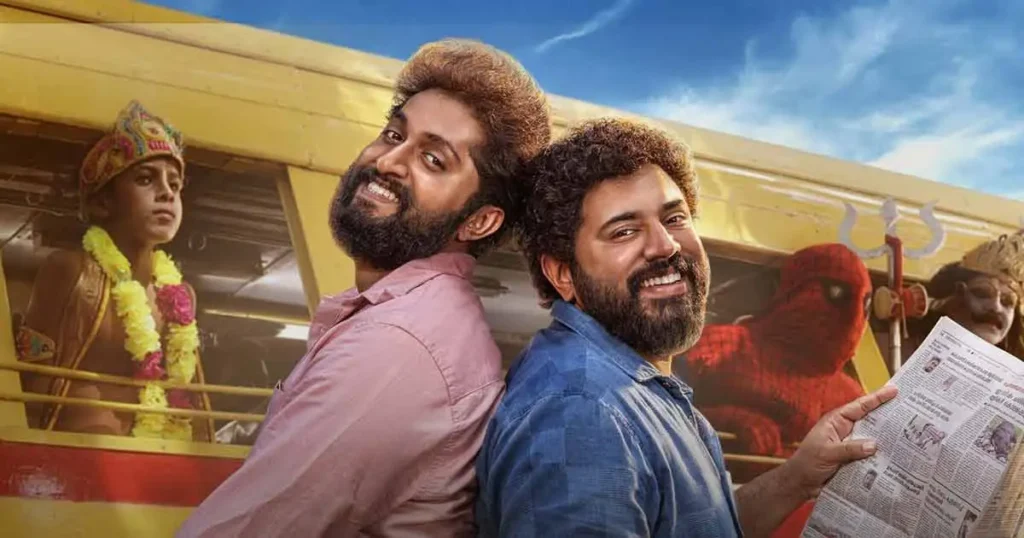The film stars Nivin Pauly, Dhyan Sreenivasan. The message is so obvious that you see the ending from a mile away.
The opening stretch of Malayalee from India deposits us on a mountain road, as a Hindi song with sad lyrics plays in the background: “Dilon mein faasle hain… Yeh kaisi khamoshi hai…” The words talk about the distances between people, and as we see Gopi (Nivin Pauly), we wonder how this sorrow applies to him. I thought the story is about finding out who this Malayalee man is and what he is doing in this strange place where most people seem to be Muslims. Well, technically, that is the story, but writer Sharis Mohammed and director Dijo Jose Antony make us wait all the way till the interval point to get there. Meanwhile, we go back in time, to a village in Kerala, to discover who Gopi was before he became the Gopi on this bus on that mountain road. That earlier Gopi is a no-good guy, with a no-good friend named Malghosh (Dhyan Sreenivasan). They love instigating fights, playing cricket, and the one thing they love even more is not having a job. They are apparently active in a local political party, but there is nothing we see Gopi do other than make announcements from a Jeep, with a mic in hand. Oh, and they are utterly shameless.
Gopi wonders how nice it would be if unmarried, unemployed young men got a pension just like widows do. The director gives us a rat as a metaphor for Gopi. When Gopi has a bath, the rat ends up bathing, too. When Gopi wanders around aimlessly, the rat wanders around aimlessly, too. And when Gopi gets trapped, the rat gets trapped, too. And once that happens, we end up with a cat as a metaphor. As you have probably guessed, this is a very heavy-handed film, and it beats us on the head with its agenda of universal brotherhood. We get visions of both unity and enmity. Gopi’s sister has a Muslim boyfriend. Gopi’s neighbours are Muslims. Shine Tom Chacko appears in a brief part as a Collector who advises people not to mix religion and politics. An elderly Muslim talks of attempts to turn Kerala into Gujarat, if you know what I mean. As for the other end of the spectrum, we get bigots and hatemongers, and a Hindu man who commits a hate crime against a Muslim family goes unpunished. And what did the family do? Their children burst firecrackers when India lost to Pakistan in a cricket match.

These two threads – the game of cricket, and the hostility between India and Pakistan – are a big part of the screenplay’s structure. For a while, Malayalee from India is reasonably engaging. The sudden tonal shifts between comedy and drama are bizarre – as in, there are many times we think we are in a dead-serious situation, and suddenly there is a joke. I was never convinced by this approach, though I admit there are some big laughs. The bit where the sister tries to talk about her boyfriend while Gopi is in a life-or-death situation is a scream. Manju Pillai is fantastic as Gopi’s mother. Her razor-sharp line readings contribute hugely to the proceedings. Nivin, too, is in his element, and his inherent likeability carries the bulk of the movie’s baggage. But even he can’t do much once we get to the interval point, and the story transforms into one long and preachy stretch of Hindu-Muslim bhai-bhai, with Jakes Bejoy adding to the screenplay’s emotional manipulation with an emotionally manipulative score. The interval point is reminiscent of Aadujeevitham, and the second half – which brings in the pandemic – is about an Indian and a Pakistani learning to live together like brothers, referring to realities like the LoC and terrorism and innocent victims.
But the writing is painfully shallow, and the comedy (like a gay joke) keeps undercutting the seriousness of the message. In any case, with a message this obvious, there is no suspense about where the narrative is headed: to the la-la land where good intentions can change the world. I am not cynical. I certainly hope that the things shown in Malayalee from India will happen. But in a film, there is only so much lecturing you can take. And there are only so many story threads you can follow. There is a whole subplot about a useless man developing a set of survival skills over time – and the film would stand even without it. Not all Hindus are good. Not all Muslims are bad. Do we really need a movie to tell us this?



